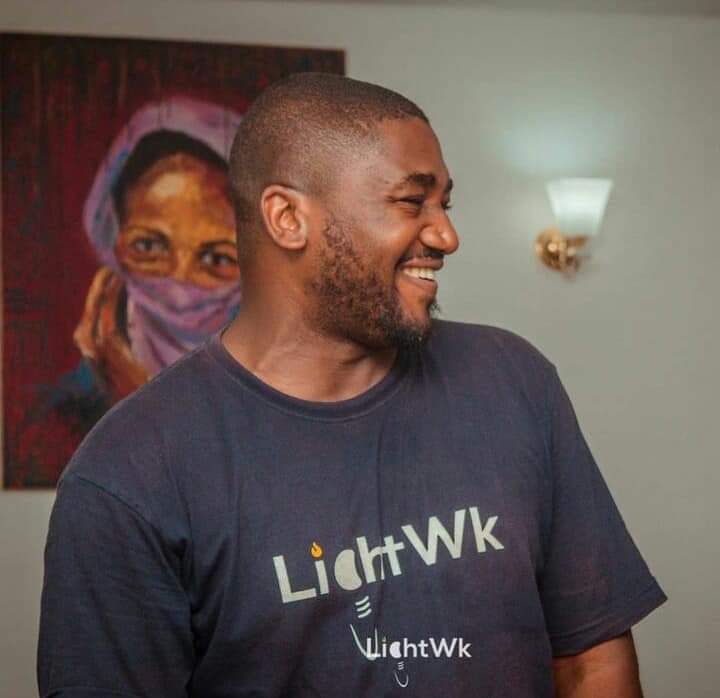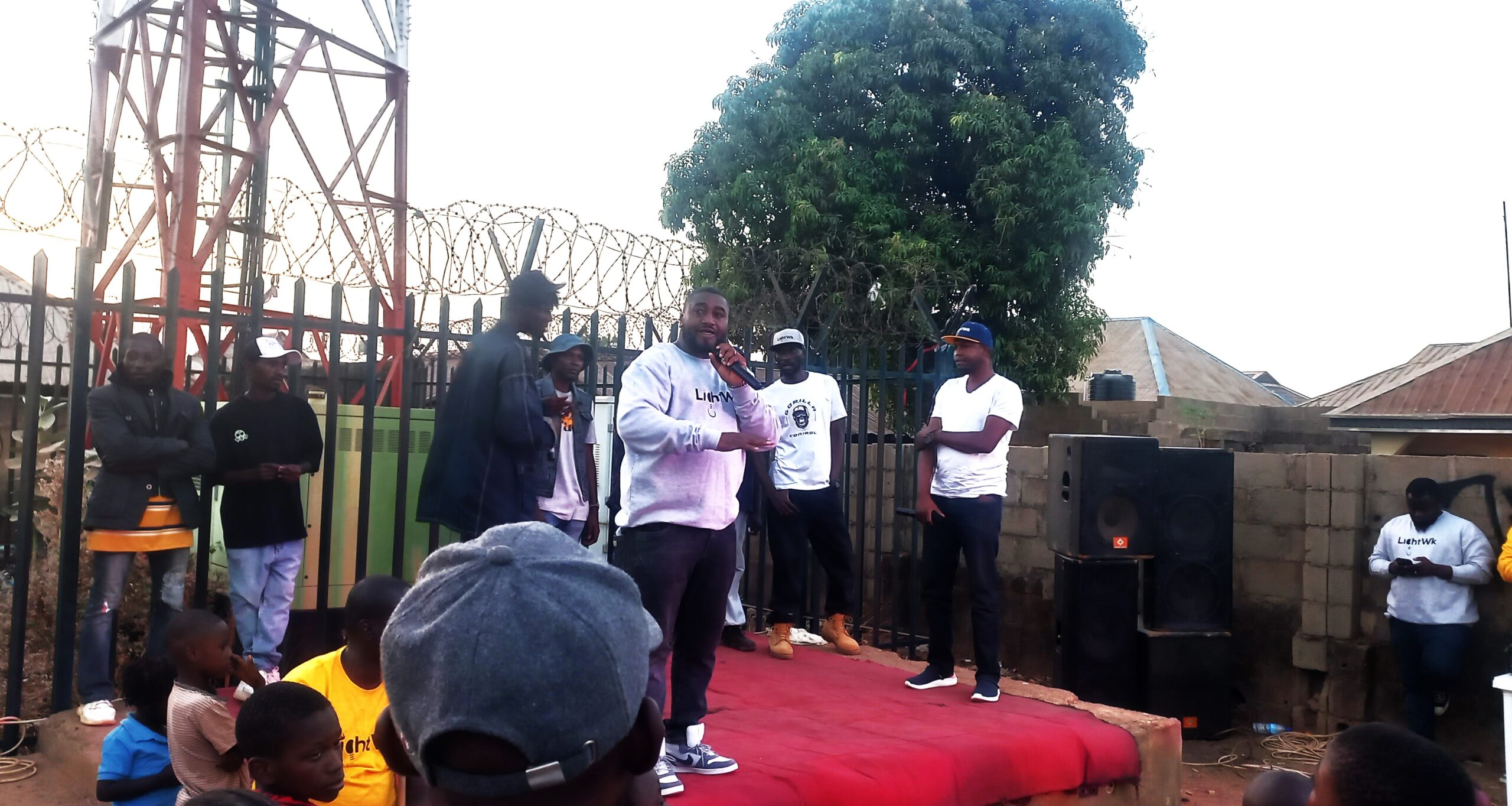“I will never stop smoking,” Apollos Daniel Yashim had vowed in 2019.
But that would change.
Yashim, 34, did drugs at a spot nicknamed ‘antenna’, near a telecommunications mast in Narayi, a suburb of Kaduna city in northwest Nigeria. In this rocky neighbourhood, he smoked wrap after wrap of marijuana and other narcotics until he dropped to the ground, semi-conscious (every time).
Now, in retrospect, Yashim figures those wraps he smoked ran into hundreds per day.
“I could even see myself in America,” he recollected with a faraway look in his eyes. His life was a haze of hallucinations, trading cash for drugs to feed his addiction.
This was the case for about 14.3 million people, according to a 2019 survey led by Nigeria’s National Bureau of Statistics. But Yashim’s encounter with a stranger in 2019 would change his trajectory alongside many others within and outside Kaduna.
Rap battle
One day in 2019, Yashim and his friends were at their den when a Peugeot 206 pulled up, revealing a tall, dark man. His name was Jeremiah Aluwong, a Christian gospel rapper known by his stage name Spokesman.
When Aluwong brought out a portable CD player and proposed a rap battle to the boys, they were intrigued. The only twist was that there would be no cursing. To boost their morale, he dropped a prize of a hundred thousand naira (about $61 today), a t-shirt and a baseball cap. Days later, Aluwong returned not with music but with Bible studies, provisions and food.
At first, the young men puffed continually into the air as they studied the Bible. Aluwong had made it clear that it was their attention he needed the most. Soon, the group learnt to put away their marijuana each time he visited. The Bible study group moved to a school, and then Aluwong saw the need to properly ‘disciple’ the boys.

Antenna, the spot where he met Yashim, was code-named Genesis, symbolising a new beginning for the young men. As Yashim and his friends pointed out other drug spots, colloquially referred to as jungles, that needed intervention, Genesis became the launch pad for reaching out to addicts in those areas.
“The jungles rose to become more than 60 in different parts of Kaduna,” said 48-year-old Christopher Monday, who was nicknamed headmaster for being older and hooked on marijuana for over 28 years.
The Light Centre
Determined to give greater care and attention to addicts, Aluwong launched The Light Center in 2021 as a recovery shelter for drug addicts. Located in the Sabon Tasha area of Chikun local government in Kaduna, the centre became a project of LightWk Foundation, a Christian urban missions organisation founded by Aluwong.
In addition to boarding rooms, the facility also boasts a kitchen, a lecture hall, a library, a recreation space, along with a chapel. Residents engage in a structured programme that includes book reviews, bible studies and training in skills such as tie and dye, sewing, video editing and printing to provide the necessary discipline.
“From Mondays to Wednesdays, we do book reviews. After seven weeks, an examination takes place. Each person reviews 30 books in total [within the first seven weeks], including one that speaks personally to them,” Adamu Danjuma, the lead administrator, explained. “In the exam, they are expected to write about how what they have read applies to their lives and how they intend to implement it.”
Residents start their day as early as 5 every morning. They are restricted from venturing outside the compound. Once, a resident got dismissed for touching the gate.
“Some ended up leaving prematurely and returning to their old lifestyles because they thought the discipline at the centre was too strict. But for me, I never thought I would stop smoking for a day. Without it [smoking], I couldn’t sleep. I felt uncomfortable…Weak. Sick. But the discipline helped me,” Yashim said.
Besides, residents watch documentaries about drug addiction, its cause and effect, and receive talks on post-recovery. Together with the book reviews, this leaves a profound impact on them.
“One of the books that encouraged me the most was ‘Think Big’ by Ben Carson. Carson was very dull, they made fun of him in class and laughed at him because he didn’t know anything. He started reading voraciously and ended up becoming the best student in the school. That encouraged me to do better,” Yashim, now the centre’s compound master, recalled.

Biopsychosocial spiritual, or BPSS model, as Aluwong called it, combines spiritual and social activities to help residents break with their addiction.
“In that approach, you don’t use drugs or injections or anything, contrary to methods that are used in psychiatric hospitals and most rehabilitation centres,” Aluwong remarked.
Catching up on lost time
Sambo Bako, a university drop-out, had aspired to join the Air Force Institute of Technology, but doubted his abilities due to an extreme addiction to Codeine and Rohypnol.
Bako would later groom the-now-34-year-old’s confidence. Bako was introduced to the Light Centre by his sister in 2023 after he admitted that he was “tired of going in circles.” The structured environment groomed him and bolstered his confidence. Today, the 34-year-old studies aircraft engineering at Air Force Institute of Technology, Kaduna.
“It wasn’t easy being in a place [the centre] for three months without seeing people [from the outside world], without your phone…But everything was deliberate. Everybody was rooting for you to succeed. The staff and those who came to the centre for fellowship,” he remembered.
“The chores…Cleaning, mopping…It was after I left that I learned that it gave me a sense of responsibility. There was also the prayer life. We had our cravings, but the activities made us forget it. It was hectic but worth it in the end,” Bako added
Why hip-hop?
Aluwong’s choice to use hip-hop as a medium to reach these young drug addicts is strategic. “In the jungles, you find street boys and girls and one of the languages the jungles understand is hip-hop. That’s why when we go to the jungles, we speak the hip-hop and rap language, which a lot of the boys are passionate about.”
While the Light Centre does not discriminate based on religion, Aluwong says the programme is Christ-centred, aiming to portray Christ’s love to addicts.
Approximately 314 residents have passed through the recovery centre since its inception, although not all of them finished it. Many have come from Kaduna’s 152 jungles, yet some have been drawn from Adamawa and Plateau states and the federal capital.

Aluwong’s rehabilitation centre has earned recognition from the Kaduna State government.
“Over the years, they have become a place of refuge and restoration to countless numbers of people with drug use disorders. We at KADBUSA [Kaduna State Bureau for Substance Abuse Prevention and Treatment] are proud to be partners with them to provide whatever support we can as a state to extend services down to the community level,” said Joseph Ike, the director of KADBUSA.
Despite its success, the centre does not solicit grants. Sponsorship comes from Lightwk Foundation members, professionals from different walks of life, who contribute to its evangelism and fellowship activities.
Another challenge is dealing with residents brought in by their parents against their will. “When we discover this, we let them go,” Danjuma said. He emphasised that the centre does not compel anyone to undergo the programme.
For residents that are committed, though, life at the centre could be the beginning of a new chapter. Today, Yashim is pursuing a degree in mission and evangelism, sponsored by the centre, at a Christian theological seminary.
“I also own a fish pond,” Yashim says, a shy smile creasing his lips as he adds, “I started with about 50 fingerlings and now I have up to 200.”
This story was supported by the Centre for Religion and Civic Culture at the University of Southern California, through its global project on engaged spirituality.
In 2019, Apollos Daniel Yashim, heavily addicted to marijuana and other narcotics, encountered Jeremiah Aluwong, a gospel rapper known as Spokesman, at a drug den in Narayi, Kaduna. Aluwong initiated a rap battle without cursing, capturing Yashim’s and his friends' attention and gradually introducing them to Bible studies. This marked the beginning of Aluwong’s outreach, nicknamed ‘Genesis,’ aimed at helping drug addicts in Kaduna’s various ‘jungle’ drug spots.
To provide structured recovery support, Aluwong founded The Light Center in 2021, a recovery shelter under the LightWk Foundation. The center offers a comprehensive program including Bible studies, book reviews, skills training, and a disciplined daily routine. Residents engage in activities to instill responsibility and provide a supportive community. Despite some leaving due to its strictness, many have benefited, like Yashim, who quit smoking and is now studying mission and evangelism while running a fish pond, and Sambo Bako, who overcame an addiction to study aircraft engineering.
Aluwong’s use of hip-hop to connect with addicts has proven effective. The Light Center has received recognition from the Kaduna State government for its role in addiction recovery, although it operates without external grants, relying on local support. To date, it has assisted over 314 residents, providing a new beginning for those committed to the program.
This story was supported by the Centre for Religion and Civic Culture at the University of Southern California, highlighting the global impact of engaged spirituality.






